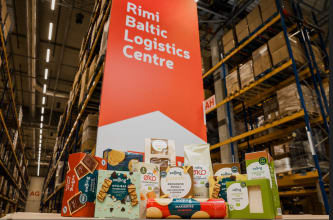
Rimi has launched a pilot project across the Baltics to switch to a cage-free egg assortment only in order to encourage responsible shoppers. This means that in 13 central Rimi stores in Vilnius, Kaunas, Tallinn, Tartu, and Riga, the third type, cage-kept hen eggs, have been completely eliminated from the assortment. This is part of a gradual move by Rimi to sell only cage-free eggs.
In the first phase of the pilot project, assortment changes were already made in selected stores in May, and following successful results, the number of participating stores is being expanded.
According to Rimi, demand for cage-free eggs has increased by 23% in the first half of 2024 compared to 2023 across the Baltics. This change is mainly driven by the major egg producers working to adapt their offer, with large-scale plant conversions playing a key role. Most Baltic hens are still kept in cages. In Lithuania and Estonia, the figure is 80%, while in Latvia less – 68% hens are caged. Therefore, the pace at which each of the Baltic countries moves towards selling only cage-free eggs depends both on changes in buyer demand and on the willingness of producers to make this shift.
"Our aim is to promote animal welfare, and in the case of laying hens this would be facilitated by moving away from type 3 eggs, but it is important to understand that the supply on the shelves is directly influenced by demand. That is why we are constantly working to encourage more responsible choices by shoppers because it is their demand that can best drive the transformation of the whole market. We are pleased that our efforts and those of other industry players are bearing fruit. Analysing buyer trends in the Baltics, we see a high willingness to choose eggs from happy hens more often, with particularly striking results in the first half of the year in Estonia, where buyer demand for eggs laid outside cages increased by 52%. Out-of-cage egg production in Estonia is currently a relatively vacant niche, which is why we observed a shortage of local cage-free eggs. Overall, Rimi's customer demand trends show that consumer awareness of animal welfare and the different types of eggs is only increasing," says Linda Jākobsone, Category Management Director at Rimi Baltic.
At the same time, Rimi is continuously running various customer education campaigns to raise awareness about the different living conditions of laying hens and motivate them to choose eggs from hens raised outside cages. The eggs of the happy hens can be identified by the first digit of their marking - 1, 2 or 0. The number 2 means that the hen spends her daily life in the coop, the number 1 denotes hens that move freely in and out of the coop, and the eggs marked 0 come from organic farms. Rimi's private-label egg range has now also been significantly expanded with cage-free eggs, and a new packaging design has been introduced to help better identify the different types of eggs.
Linda Jākobsone is positive about the results of the pilot project: “The first sales data from the pilot stores confirm the observed demand trends. In the shops in the centre of the largest cities in Latvia and Lithuania, shoppers are positively receptive to this innovation and easily adapt their choice to Type 0, Type 1 or Type 2 hen eggs, choosing from a range of both domestic and foreign producers. In Vilnius and Kaunas, we observed a 6% increase in sales of eggs from cage-free hens in the first three months of the pilot. Meanwhile, in Estonia, buyers are more focused on eggs from local producers and Estonian producers need to catch up with the growing demand for cage-free eggs. This in turn highlights growth opportunities for producers to improve the conditions under which they keep their laying hens to increase sales of their products."
Rimi will carefully analyse the purchasing trends of cage-free eggs in the pilot stores to continue expanding activities that help care for animal welfare throughout the supply chain and promote the availability of locally produced products.



